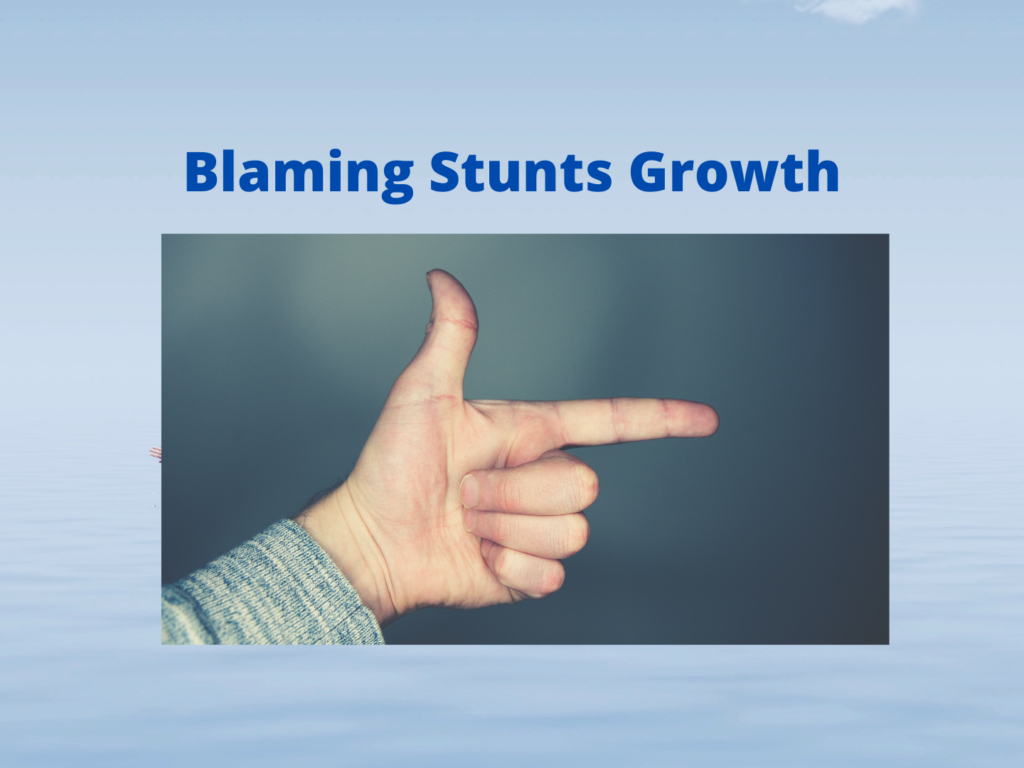There is a saying, “When you point a finger at someone else to blame them for what happened, you have three fingers pointing back at yourself.”
When I was young and would complain about something a friend said or did to me, my mother would always reply with, “What part did you play in it.” That used to get me really frustrated because the girl was just a mean girl and I wasn’t. I tried to be nice to people and when she would say that, it hurt my feelings. I didn’t realize at the time that my mother wasn’t saying I had to have been bad to have had her treat me that way, because that is how I took it. What she was saying was; as long as I responded to the mean behavior, I was playing into it and it would continue. It was recognizing my role because I showed the mean girl I was affected by her cruelty that fed her. Once I stopped allowing her mean words to affect me, she went onto another girl. It’s not easy finding out we have a role in how we react and respond to everything that happens to us. By blaming others, we never grow or change the situation.
All too often I heard students blame others when they found themselves in a tough situation. If they forgot a backpack, they would blame their mother. When the homework came in messy, they blamed their sister or brother for taking up all the room on the table, so they didn’t have a good place to work. If caught talking in an inappropriate time, they would blame the person they were talking with at the time. If they didn’t do well on a test, they would have a hundred excuses for the poor performance never accepting the reality that they did not pay attention in class or review the material enough. Even adults who are perpetually late to events will consistently blame it on the traffic. I don’t know where we learn to blame others instead of accepting responsibility for our part in it. But, it is a very common reaction of most people when they make a mistake. This blaming does not lead to personal growth.
I believe that a lot of people make excuses because as a child they got the impression that it wasn’t okay for them to make mistakes. If it is someone else’s mistake, then their parents wouldn’t get mad at them. If Johnny took something from a store and got caught and blamed it on Scott telling him to do it, then the real bad person is Scott not Johnny in the parent’s mind. Instead of counseling Johnny to not listen to Scott, they tell Johnny to stop hanging around Scott. The blaming of other’s tends to defer the fault to someone or something else.
Owning one’s mistakes is a hard thing to do. It may make people feel faulty in some way. But, when one finally does accept the role they played in the mistake, it can be very freeing and real growth can occur.
For the person who is perpetually late and continually blames the traffic, simply leaving earlier or finding a different route are solutions. For the student who forgot his backpack, he can learn to put it by the door he is going to leave from each day so he doesn’t forget it. The relative that blames others because his/her heart rate went up due to something that was said to him/her needs to learn how to manage stress. The student who got in trouble for talking to a friend could always give the friend a quiet sign and ignore the friend. At recess he/she can ask the friend not to talk during class. The child who stole something from a friend needs to learn to say no to friends. None of these behaviors will change as long as blaming is allowed.
Embracing the value of a mistake will help change the behavior or situation. Identifying the reason for the mistake. “I got a ticket because I was speeding,” and defining the because gives the reason. “I was speeding because I didn’t plan well and was going to be late to an event,” explains the why I made this mistake. “So, next time I will leave earlier and watch my speed,” defines a new behavior to replace the old one and the growth occurs from the mistake.
